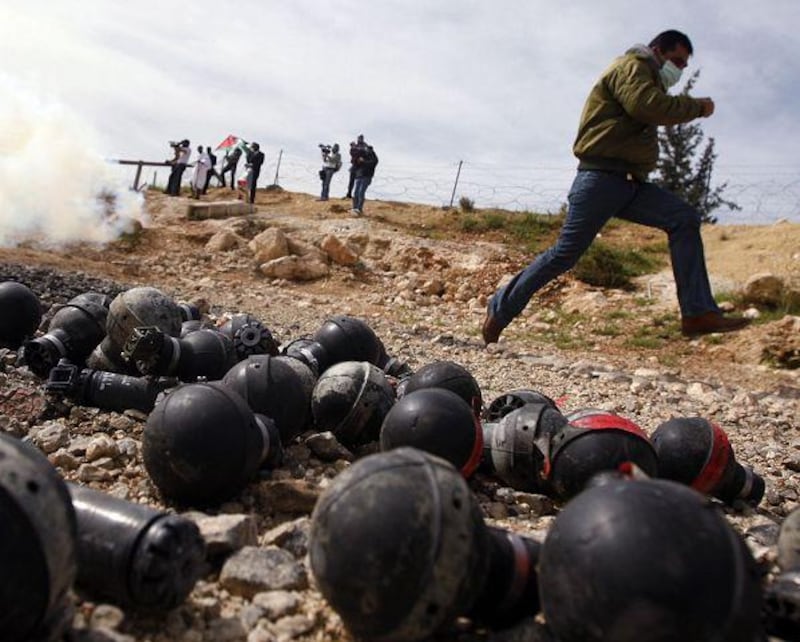RAMALLAH // Israel yesterday announced plans for a controversial settlement expansion just a day after a divided PLO Central Committee reluctantly agreed to endorse US-sponsored proximity talks. The plans for 112 apartments in the ultra-Orthodox Beitar Illit settlement in the Bethlehem area were announced as an exception to the partial settlement construction freeze that Israel agreed to in November under US pressure.
It is unlikely to play well with US administration officials, as the announcement coincides with what is supposed to be the finalisation of preparations for indirect talks between Israel and the Palestinians and on the morning of the visit of Joe Biden, the US vice president. In an interview published yesterday in Yedioth Ahronot, an Israeli daily, Mr Biden said the partial settlement construction freeze had not come through agreement with the United States or the Palestinians and that it was "not everything that we wanted".
Nevertheless, he called it an "important action that has significant impact on the ground", and he is unlikely to be happy that he has to deal with a new Israeli settlement tender at the start of a five-day visit. Mr Biden's is the highest-level US visit since the Obama administration assumed office, and Peace Now, the Israeli settlement watchdog, yesterday questioned the timing of the new settlement tender.
"The Israeli government is welcoming the vice president by demonstrating, to our regret, that it has no genuine intention to advance the peace process," a spokesman for the group said. For their part, Palestinians denounced the move. Saeb Erekat, the PLO's chief negotiator, said Israel was undermining indirect talks before they had even begun, and suggested it could derail the efforts of George Mitchell, the US special envoy.
"If the Israeli government wants to sabotage Mitchell's efforts by taking such steps, let's talk to Mitchell about maybe not doing this if the price is so high," Mr Erakat said A divided PLO central committee had on Sunday voted to give Mahmoud Abbas, the PLO chairman, the green light to proceed with indirect talks with Israel. The vote was a close run thing, with several members and parties voting against, and, according to some in attendance, agreement was reached only after heated discussions.
Palestinian opposition groups rejected the Palestinian leadership's decision to hold indirect peace talks with Israel. A statement signed by eight Damascus-based groups yesterday, including Hamas, said the decision to hold US-mediated peace talks with Israel for four months comes in response to US and Israeli pressure and is a retreat from an earlier pledge not to negotiate with Israel before it halts its settlement activities.
Such division is instructive. Palestinians from across the political spectrum have little faith that indirect negotiations will lead anywhere. Even Ehud Barak, the Israeli defence minister, whose ministry had earlier announced the tender for the new settlement units, had to concede that while Israel would prefer direct negotiations, the "climate" only allowed for the present formula. Mr Erekat, meanwhile, cautioned on Israel Army Radio that the indirect talks would be the "last chance" for the peace process.
"The relationship has deteriorated to a stage where the US is trying to save the peace process with this last attempt - by the way, mark my words, this will be the last attempt in order to see if it can be a tool to make decisions between Palestinians and Israelis." This is not the first time such dire predictions have been heard from officials, but there is little doubt that confidence is at an all-time low, and that few on both sides believe the proximity talks will lead anywhere.
Certainly, a growing number of Palestinians outside Hamas believe that the negotiations strategy has failed and, in contrast to Hamas, that efforts should instead be devoted to non-violent resistance of the kind that has increasingly worried Israel in recent months. Indeed, Israel has, according to a report yesterday in the Israeli media, recently asked the Palestinian Authority to clamp down on demonstrations in the West Bank against the Israeli separation barrier as well as those against the Israeli decision more than two weeks ago to include on an Israeli list of heritage sites two religious places in the West Bank.
Israel also wants the Palestinian Authority (PA) to curtail its campaign against Israeli products and PA officials to stop attending any demonstrations. Salam Fayyad, the PA prime minister, has spearheaded a campaign to ban Israeli products that originate in settlements from entering the Palestinian market. Mr Fayyad has also attended demonstrations in the West Bank village of Bili'in, in protest at Israel's separation barrier there, which cuts farmers off from their land and is built deep in occupied territory.
Activists suggest that the growing profile of the ever more creative anti-wall demonstrations is beginning to work. Last Friday, for instance, Israeli soldiers found themselves firing tear gas at protesters in Ni'ilin dressed as Mahatma Gandhi, Martin Luther King and Nelson Mandela. A few weeks ago, demonstrators dressed as members of the Navi tribe from the Avatar film. Salah Khawaja, of the Popular Resistance Movement, which organises protests up and down the West Bank, said: "Non-violent resistance is the best strategy for Palestinians to pursue, because it is the only way, in view of the failure of negotiations, that we can ensure international support."
Mr Khawaja suggested that it was in fact the growing international solidarity with the protest movement because of which Israel wanted the PA to clamp down on demonstrations. As for the indirect talks, Mr Khawaja said Israel was simply seeking "cover to build more settlements". He said: "Israel wants talks just for the media. On the ground, it continues, all the time and in all possible ways, to build more settlements and take more land."
okarmi@thenational.ae





